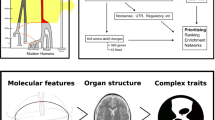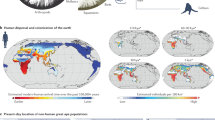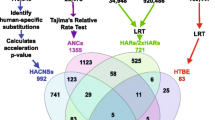Abstract
Only about five percent of our genome contains human-specific sequences. These sequences arose mostly from segmental duplications during human evolution and include genes that are unique to the human lineage. Although these genes are currently not well characterised, they may be potential key players in the development of human-specific traits, like an expanded neocortex. Here, we present an overview of the role of human-specific genes during development and evolution of the embryo - nic brain, with a focus on one of these genes, ARHGAP11B (Rho GTPase Activating Protein 11B).
Similar content being viewed by others
Literatur
Enard W, Przeworski M, Fisher SE et al. (2002) Molecular evolution of FOXP2, a gene involved in speech and language. Nature 418:869–872
Stedman HH, Kozyak BW, Nelson A et al. (2004) Myosin gene mutation correlates with anatomical changes in the human lineage. Nature 428:415–418
Florio M, Huttner WB (2014) Neural progenitors, neurogenesis and the evolution of the neocortex. Development 141:2182–2194
Lui JH, Hansen DV, Kriegstein AR (2011) Development and evolution of the human neocortex. Cell 146:18–36
Betizeau M, Cortay V, Patti D et al. (2013) Precursor diversity and complexity of lineage relationships in the outer subventricular zone of the primate. Neuron 80:442–457
Patterson N, Richter DJ, Gnerre S et al. (2006) Genetic evidence for complex speciation of humans and chimpanzees. Nature 441:1103–1108
Nahon JL (2003) Birth of ‘human-specific’ genes during primate evolution. Genetica 118:193–208
Eichler EE (2001) Segmental duplications: what’s missing, misassigned, and misassembled–and should we care? Genome Res 11:653–656
Florio M, Albert M, Taverna E et al. (2015) Humanspecific gene ARHGAP11B promotes basal progenitor amplification and neocortex expansion. Science 347:1465–1470
Fietz SA, Lachmann R, Brandl H et al. (2012) Transcriptomes of germinal zones of human and mouse fetal neocortex suggest a role of extracellular matrix in progenitor self-renewal. Proc Natl Acad Sci USA 109:11836–11841
Sudmant PH, Kitzman JO, Antonacci F et al. (2010) Diversity of human copy number variation and multicopy genes. Science 330:641–646
Camp JG, Badsha F, Florio M et al. (2015) Human cerebral organoids recapitulate gene expression programs of fetal neocortex development. Proc Natl Acad Sci USA 112:15672–15677
Author information
Authors and Affiliations
Corresponding author
Additional information
Michael Heide 2005–2009 Biologiestudium an der Universität Tübingen. 2009–2010 Diplomarbeit am Anatomischen Institut, Tübingen. 2010–2014 Promotion am Institut für Anatomie und Zellbiologie, Heidelberg. Seit 2015 Postdoc am Max-Planck- Institut für molekulare Zellbiologie und Genetik, Dresden.
Marta Florio 2007 Bachelor of Philosophy an der Vita-Salute San Raffaele Universität Mailand, Italien; dort 2008–2011 wissenschaftliche Mitarbeiterin und 2010 Masterarbeit. 2011–2015 Promotion am Max-Planck-Institut für molekulare Zellbiologie und Genetik, Dresden; dort seit 2015 Postdoc.
Wieland B. Huttner 1969–1975 Medizinstudium an den Universitäten Hamburg und Oxford, UK. 1972–1976 Doktorarbeit Physiologische Chemie, 1976–1977 Postdoktorand am Max-Planck-Institut für experimentelle Medizin, Göttingen. 1977–1980 Postdoktorand an der Yale Univer sity, New Haven, CT, USA. 1981–1985 Nachwuchsgruppenleiter am Max-Planck-Institut für Psychiatrie, Martinsried. 1985 Habilitation, Physiologische Chemie, Universität Würzburg. 1985–1990 Gruppenleiter am EMBL Heidelberg. 1991–2000 Professor und Direktor am Institut für Neurobiologie, Universität Heidelberg. Seit 1998 Gründungsdirektor am Max-Planck-Institut für molekulare Zellbiologie und Genetik, Dresden.
Rights and permissions
About this article
Cite this article
Heide, M., Florio, M. & Huttner, W.B. Die Rolle humanspezifischer Gene in der Gehirnentwicklung und -evolution. Biospektrum 22, 352–355 (2016). https://doi.org/10.1007/s12268-016-0695-y
Published:
Issue Date:
DOI: https://doi.org/10.1007/s12268-016-0695-y




